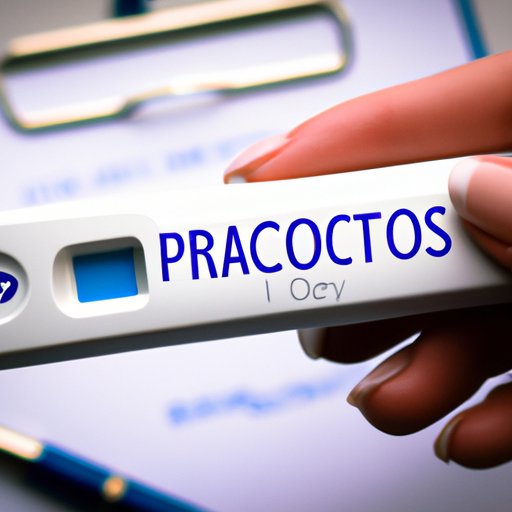
Introduction
Polycystic ovary syndrome, or PCOS, affects millions of women worldwide, with many more cases being diagnosed each year. Although it is a common health condition, PCOS is often misunderstood and misdiagnosed. Testing for PCOS is essential for early diagnosis and treatment. The purpose of this article is to provide you with a comprehensive guide to PCOS testing, including the various types of tests available, how to prepare for testing, and what to expect during the testing process.
The Ultimate Guide to PCOS Testing: Everything You Need to Know
PCOS is a hormonal disorder in women, which is characterized by an imbalance of reproductive hormones. PCOS affects the ovaries, which produce eggs and hormones such as estrogen and progesterone. When these hormones are imbalanced, the ovaries can produce cysts. These cysts can lead to various symptoms, such as irregular periods, acne, excessive hair growth, and weight gain.
It is important to test for PCOS because early detection can lead to early treatment, and that can minimize the symptoms and the risk of related complications. PCOS is a serious condition that can lead to infertility, type 2 diabetes, and heart disease, among other health issues.
At-Home PCOS Testing: Tips for Getting Accurate Results
If you are experiencing symptoms of PCOS, there are several at-home tests available that you can take to determine if you have the condition. One popular test is a blood test that measures hormone levels, including testosterone, estrogen, and luteinizing hormone (LH). Another common test is a urine test that measures hormone levels.
Before taking an at-home test, it is important to talk to your healthcare provider, who can advise you on which test to take and how to prepare for the test. Here are some tips to help prepare for your at-home PCOS testing:
- Inform your healthcare provider if you are taking any medications, including birth control pills, as these can interfere with hormone levels
- Follow the instructions provided with the test kit carefully
- Take the test in the morning, as hormone levels can fluctuate throughout the day
- Avoid eating, drinking, or exercising for at least two hours before taking the test
- Stay calm and avoid stress before taking the test, as stress can also affect hormone levels
To get accurate results from your at-home test, be sure to follow all instructions carefully and notify your healthcare provider of the results.
Understanding the Different PCOS Tests: Which one is Right for You?
There are several types of PCOS tests available, each with its own advantages and disadvantages. Here are some of the most commonly used PCOS tests:
- Transvaginal Ultrasound: This test uses sound waves to produce images of your ovaries and uterus. It can detect cysts, which are a hallmark of PCOS.
- Blood Tests: A blood test can measure hormone levels and determine if you have an imbalance of hormones, which is a common symptom of PCOS.
- Physical Exam: Your healthcare provider may perform a physical exam, checking for unusual hair growth, acne, and other signs of PCOS.
It is important to talk to your healthcare provider about which test is right for you. The test they choose may depend on factors such as your age, symptoms, and medical history.
Women’s Health: How Doctors Diagnose Polycystic Ovary Syndrome
To diagnose PCOS, your healthcare provider may perform several tests and exams. These may include:
- Physical exam: Your healthcare provider may check for signs of PCOS, such as acne, male pattern baldness, and excessive hair growth.
- Blood tests: A blood test can measure hormone levels and determine if you have an imbalance of hormones.
- Transvaginal Ultrasound: This test uses sound waves to produce images of your ovaries and uterus.
- Other imaging tests: your healthcare provider may order other imaging tests, such as an MRI, to rule out other conditions that may cause similar symptoms.
Your healthcare provider will use the results from these tests to make a diagnosis of PCOS.
A Step-by-Step Guide to PCOS Testing: What to Expect at Your Appointment
If your healthcare provider recommends that you undergo PCOS testing, here is what you can expect:
What to Expect Before Your Appointment
Before your appointment, you should talk to your healthcare provider about any symptoms you are experiencing. This can help them determine which tests to perform. It may be helpful to keep a record of your menstrual cycles and any other symptoms you experience between visits.
What to Expect During Your Appointment
Your healthcare provider will perform a physical exam and order the appropriate tests. They may ask you questions about your symptoms, menstrual cycle, and medical history. The tests may include:
- Blood tests: A blood test can measure hormone levels and determine if you have an imbalance of hormones.
- Transvaginal Ultrasound: This test uses sound waves to produce images of your ovaries and uterus.
What to Expect After Your Appointment
After your appointment, your healthcare provider will review the test results and make a diagnosis. If you are diagnosed with PCOS, they will discuss treatment options with you. Treatment may include lifestyle changes, such as diet and exercise, and medication.
Conclusion
PCOS testing is essential for early diagnosis and treatment of this common hormonal disorder. If you are experiencing symptoms of PCOS, it is important to talk to your healthcare provider, who can recommend which tests to perform. At-home tests are available, but it is crucial to follow all instructions carefully and notify your healthcare provider of the results. With early detection and treatment, PCOS can be managed effectively, reducing symptoms and the risk of related complications.
If you suspect you have PCOS, take control of your health and talk to your healthcare provider today. For additional information on PCOS testing and diagnosis, visit www.womenshealth.




